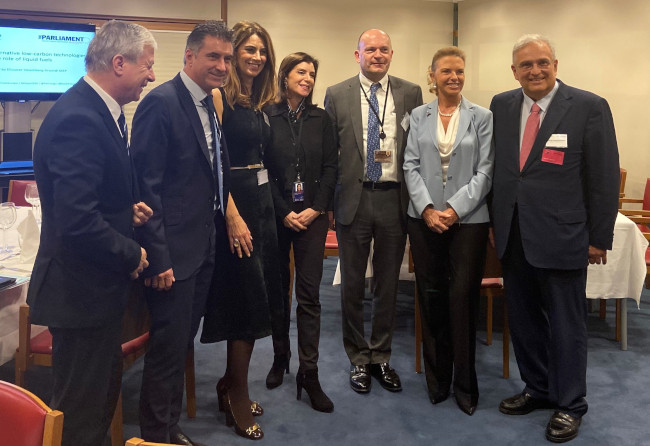 3 minutes
3 minutes
From the left, the Cypriot MEP Lefteris Christoforou, the Greek MEP Theodoros Zagorakis, the Director of Energy Policy and International Affairs of the HELPE Group, Mrs. Liana Gouta, the Greek MEP, Mrs. Anna-Michelle Asimakopoulou, the Director General of FuelsEurope. Mr. John Cooper, the MEP and member of the Committee on Transport and Communications Mrs. Elissavet Vozemberg, who hosted the event and the Chairman of the BoD of HELPE, Mr. Ioannis Papathanasiou.
“Vision 2050”, the holistic proposal of the European Refining Sector, on the Refinery of the Future and the production of innovative, low-carbon fuels, was presented by Mr. John Cooper, Director General of FuelsEurope, during an event organised by FuelsEurope and the Parliament Magazine and hosted by Greek MEP Eliza Vozemberg at the premises of the European Parliament in Strasbourg.
In her opening remarks, Ms. Vozemberg stressed the importance of allowing all sectors of the economy to contribute to the EU objective for climate neutrality, as well as the need to support all innovative low-carbon technologies, given that there is no “magic solution” in achieving the energy transition.
The event was attended by the President of HELLENIC PETROLEUM Mr. Yannis Papathanassiou, who had, in recent statements, referred extensively to the Group's fundamental goal of becoming an innovative provider of low-carbon energy products, by improving energy efficiency and reducing CO2 emissions.
"As one of the active members of FuelsEurope for years, the HELPE Group has closely followed international and European developments and contributed to the formulation of the Vision 2050 proposal, presented by the entire European Refining Industry," Ms. Liana Gouta, the Group’s Director on Energy Policy and International Relations, emphasized in her turn.
During the presentation of the industry's "Vision 2050", Mr. Cooper, Director General of FuelsEurope, stated that new technologies, including electrification, promise viable solutions for areas such as passenger cars and light trucks, however liquid fuels remain unbeatable in all other sectors of transport, like aviation, shipping and heavy duty vehicles, for which there is currently no alternative technology for the reduction of emissions. Liquid fuels can play a critical role in contributing to the EU's energy transition towards climate neutrality in 2050, as they will come from synthetic hydrocarbons in the future.
The fuels of the future will be produced through a low carbon production process and using new raw materials and technologies, such as biofuels and biomass, hydrocarbon vegetable oils, municipal or plastic waste, algae, renewable electricity and green hydrogen CO2.
It is noteworthy that the Airlines industry (IATA) is planning to reduce emissions relying on the development of low carbon liquid fuels (Sustainable Aviation Fuels-SAF), while other energy-intensive industries - such as the chemical and lubricant ones – are also dependent on liquid fuels and refined products. Low carbon fuels will, therefore, contribute to the energy transition of these industries.
However, the transformation of refineries and the large-scale development of these new products, necessary for the energy transition of large sectors of the economy and industry, will require major investment in new technologies, as well as a supportive, stable and predictable institutional framework, which should recognise the contribution of these fuels to the reduction of CO2 emissions.
At the same time, measures are necessary to support the international competitiveness of the industry so as not to "push" all this activity out of Europe. In this way, the EU will have a new opportunity to take the lead in industrial transformation and the development of low-carbon technologies.
"The European refining industry shares the global concern about the effects of climate change and is committed to meeting the EU's goal of transitioning to a carbon-neutral economy by 2050. With our proposals, the transition will be fair and the achievement of the European climate change objectives smooth for national economies, societies and businesses" the Director General of Fuels Europe underlined in his statement.
The presentation of "Vision 2050" followed a very interesting debate between Greek and foreign MEPs, as well as executives of refining companies and companies, present at the event.